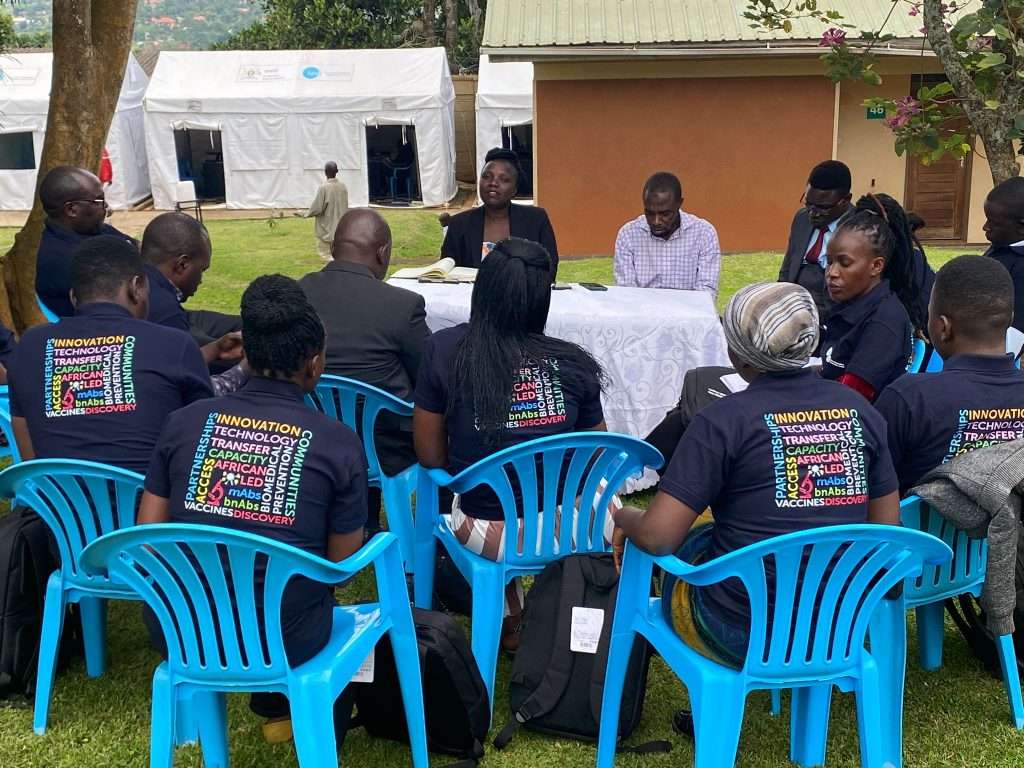By Joan Cate
Researchers of the HIV Vaccine Program at Uganda Virus Research Institute(UVRI-IAVI) will conduct a study among females below 25 years to assess the efficacy of Lenacapavir, an HIV prevention injectable drug. The drug developed by US company Gilead Sciences, Inc, is under trials globally including in Uganda to prevent HIV in people at most risk. Participants will get an injection of the drug twice a year compared to those who take Pre-exposure prophylaxis (PrEP) pills every day.
Dr. Brenda Oketch, the Head of the Uganda HIV Vaccine Program says 400 girls and women aged between 15 to 25 years living in fishing communities in Uganda will be targeted for the study. She made the statement during a training of health journalists on Monday, ahead of World AIDS Day.
It is estimated that 1.4 million people are living with HIV in Uganda, with 54,000 new infections reported in 2021 and 17,000 related deaths recorded.
As Uganda marks World AIDS Day today, Dr. Oketch says researchers are concerned about new infections in young people, more so women and girls who stay near landing sites, involved in fishing, fish mongers, and boat owners among others because they are at risk of contracting HIV.


In 2014, Gertrude Nanyonyo, Brenda Oketch, and Dr. Ali Ssetaala among others conducted a study titled “Prevalence and correlates of HIV infection among adolescents and young people living in fishing populations along Lake Victoria Fishing Communities in Uganda. The study involved over 600 participants and it noted that young people aged 20-24 years were twice likely to be HIV infected as those aged 13-19 years and also that females were three times as likely to have infections as males.
The study revealed that just like previous studies in fishing communities in Kenya, Malawi, and Uganda, HIV prevalence among young females was more than three times higher than that of males in the same age group of 13-24 years. This was due to girls engaging in early sexual activity, engaging in transactional sex in form of sex-for-fish or sex-for-money and other gifts, male child preference, and limited access to HIV services among other factors.


The researchers thereby recommended the development of targeted, tailored interventions to reach this high-risk population, necessitating the new study at the institution.
Dr. Oketch explains that the study, named Multisite Adolescent Girls and Women Study is also being done in South Africa and Zambia to recruit 400 females aged between 15 to 25 years, with the aim of reducing new infections among the most at-risk population. She noted, “as researchers, we just need to keep engaging the stakeholders and engaging the young women themselves so that a product comes that they really can use.”
Oketch added “because we learned from a previous study where we had done women who were over 18 years but they had a lot of issues about the tablets. They would say even when I’m traveling it’s rattling in my bag and it’s like shouting out that I have something. So they want something discreet. So engaging with these adolescent girls will help us better understand what kind of product will really work for them.”


She explains that nearly 100 participants have expressed interest.
The participants will choose to take the injection every six months or tablets during the exercise expected to end next year, according to Dr. Oketch.
Dr. Ali Ssetaala, the Head of Community Studies, says the key information needed from the research is about the efficacy of Lenacapavir the injectable drug in comparison with tablets and convincing females in the target age group in the fishing community in Mityana, Masaka, and Kalangala districts to embrace either options once proven that they are safe.”Lenacapavir is a drug that affects the shell of the HIV virus, preventing it from multiplying or replicating.
We are looking at recruiting young girls and women for testing the efficacy of the drug Lenacapavir and we believe that once this drug is shown to be efficacious among these high-risk young girls and women for Pre-exposure prophylaxis it will be an addition to the already approved medication Cabotegravir(injectable drug taken every two months).”
Ssetaala adds that Lenacapavir has the potential to reduce the number of visits to the health facility from six times a year, for those receiving Cabotegravir injections to twice a year.
Last month, Jessica Ababiku the Chairperson of the parliamentary committee on Presidential Affairs noted the need to scale up efforts to reduce new infections among young people. Ababiku, who is also the Adjumani District Woman MP, said the Uganda AIDS Commission, Ministry of Health, and other stakeholders must refocus on the prevention of infections, unlike current activities which are geared towards treatment. “HIV kills, this is a message we must emphasize.
Otherwise, young people are engaging in risky behaviors thinking they can survive on medication once they contract HIV. This attitude will prevent us from ending HIV. So we must each do our part in reducing new infections, in men, women, boys, and girls” Ababiku noted.
































